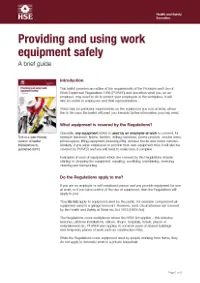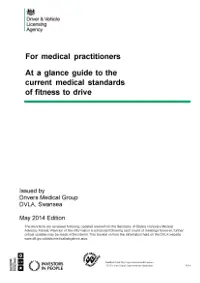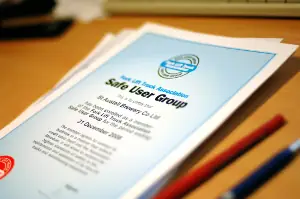Rider-operated lift trucks: Operator training and safe use, Approved Code of Practice and guidance (L117)
Introduction
The Health and Safety Executive (HSE) is the national independent watchdog for work-related health, safety and illness. The organisation acts in the public interest to reduce work-related death and serious injury across Great Britain’s workplaces.
“Rider-operated lift trucks: Operator training and safe use, Approved Code of Practice and guidance” (known throughout the industry simply as “L117”) is the HSE’s primary guidance publication on the safe operation of fork lift trucks and was revised in 2013.
Who it’s for
L117 is aimed at employers and those responsible for the safe operation of lift trucks, as well as those in control of worksites, the self-employed, managers and supervisors. Others involved with lift trucks, such as trade union health and safety representatives and lift truck trainers, may also find it useful, but it is not intended to replace formal training.
Contents
L117 includes the following:
- an outline of the main legal requirements relating to lift trucks
- the Approved Code of Practice (ACOP) text and associated guidance on operator training for stacking rider-operated lift trucks. This will help employers meet their legal obligations to make sure all operators receive adequate training
- information on features of lift trucks that you need to consider
- guidance on the safe use of lift trucks and how to protect pedestrians
- guidance on the maintenance and Thorough Examination of lift trucks.
Not just FLTs
It is important to note that, although the ACOP text relates to stacking rider-operated lift trucks, as an employer your duty under PUWER 98 is to ensure that operators of all types of lift truck are properly trained:
“Operators of types of truck not covered by the ACOP (Approved Code of Practice) text, for example pedestrian-operated trucks, ‘stand-on’ pallet trucks that do not lift materials for stacking, and straddle carriers, will also need training. The advice given in the ACOP text and the guidance on training can be used as an indication of the standard of training to provide for all types of lift truck.”
The crucial point is that employers must meet their legal obligations and ensure that all operators receive adequate training, regardless of the vehicle.
The new document incorporates most of the information which was contained in Safety in working with fork lift trucks (HSG6) and fully replaces it.
It’s the law
The reason why L117 is such an important document is because it’s designed to ensure that you fulfil your obligations, as required by the law.
All the guidance and advice contained within it relates to the seven main pieces of UK legislation that govern the safe use of fork lift trucks in this country.
These seven legal statutes are:
- Health and Safety at Work Act 1974 (HSW Act)
- Management of Health and Safety at Work Regulations 1999
- Provision and Use of Work Equipment Regulations 1998 (PUWER)
- Lifting Operations and Lifting Equipment Regulations 1998 (LOLER)
- Workplace (Health, Safety and Welfare) Regulations 1992
- Control of Substances Hazardous to Health Regulations 2002 (COSHH)
- Construction (Design and Management) Regulations 2007 (CDM)
L117 goes far beyond simple risk assessments and basic training, stating the regulations, then what they mean in practice, on all manner of issues. For example:
- legal responsibilities of companies, managers and employees
- choosing and maintaining equipment
- Thorough Examination
- workplace layout
- fumes, fuels and battery acid
- dealing with agency workers
…and many other subjects besides.
In every case, as an employer, you need to be able to show that you know the law and are complying with it.
Revised in 2013, L117 now includes four key considerations for those responsible for ensuring safe FLT operations, each of which are outlined below.
Refresher training
Once an employee is trained, how long is that training valid? Contrary to popular belief, there is actually no legal requirement for fork lift truck operators to receive refresher training at specific intervals.
Even the best fork lift operators can, if left unchecked, become complacent with safety measures or develop bad habits over time.
Reassessment allows employers the opportunity to identify and address such lapses before they lead to potentially serious accidents. The new guidelines recommend automatic refresher training or a retest after a set period of time, e.g. three to five years, as the best way to ensure employees remain competent.
When set refresher training is adopted, managers and supervisors must still monitor performance in case operators need extra training before the end of the set period.
In addition to this, formal re-assessment is likely to be needed where truck operators:
- have not used trucks for some time
- are occasional users
- appear to have developed unsafe working practices
- have had an accident or near miss
- have changed their equipment or environment.

The ‘Example of employer’s training record’ within the L117 appendices has been amended to include details of refresher training.
Supervisor training
The importance of supervisor training is covered by the Health and Safety at Work Act. However, it is now considered so important that L117 now mentions it too. Unlike some other guidelines, this is not a recommendation – it’s a solid requirement:
The HSW Act requires you to provide adequate supervision. It is essential that supervisors have enough training and knowledge to recognise safe and unsafe practices. This does not mean they need full operator training, but they do need to understand the risks involved, and how to avoid or prevent them. Some organisations offer training courses for supervisors and managers of lift-truck operations.
Supervisors should be able to:
- carry out an effective observation and know what to look for
- communicate effectively with operators and line managers
- recognise unsafe practice and behaviour
- maintain and promote health and safety standards.
Daily or Pre-shift checks
While this isn’t strictly a new addition to the L117, its importance warrants inclusion here.
The revised guidelines state that, at the beginning of each shift, operators should check their lift truck in accordance with the vehicle handbook, and document the findings. Any defects identified which could affect the safe operation of the vehicle must be reported to a supervisor to ensure they are fixed.
Medical considerations
Disabilities (mental or physical) do not automatically disqualify an individual from being a fork truck operator. Fitness for such work should be evaluated on a case-by-case basis through risk assessment and medical advice.
The latest L117 guidelines suggest that the DVLA’s publication, At a glance: Guide to the current medical studies of fitness to drive, can be applied to all fork lift trucks – not just those operating on public roads.
This document can be downloaded for free here.
Guidelines recommend that operators possess a standard of fitness equivalent to that required of an ordinary driving licence.
However, for more technical work, such as demanding environments, night driving or moving hazardous materials, it is suggested that lift truck drivers possess a level of fitness equivalent to that of a heavy goods vehicle (HGV) licence holder.
While the HSE does not demand medical assessments to determine fitness to operate a fork lift, the new guidelines suggest that managers may wish to screen potential operators before placement. From there, employers could administer medical examinations according to the DVLA’s HGV licence requirements – every five years for operators over the age of 45, and every year for those over the age of 65.
As ever, medical advice should always be sought if there is any doubt as to a person’s physical or mental fitness to safely operate equipment.
Conclusion
Put simply, L117 is the key document for anyone responsible for managing materials handling operations. It is available to download for free here.
UKMHA Safe User Group
It is always useful to have someone to talk to if you’re unsure how best practice applies in your individual situation, and to be updated about any changes to the regulations and what they mean in practice – especially if you’re running a busy warehouse.
So to help, the UKMHA designed its Safe User Group: an information service and straight-talking telephone helpline that keeps managers safe, up-to-date and on the right side of the law.
Safe User Group membership will provide you with a comprehensive range of easy-to-follow safety resources including Fact Sheets, Technical Bulletins, regular updates on legislative changes that affect FLT operations, a health and safety newsletter, access to specially discounted publications, and an independent FLT telephone helpline.
The UKMHA Safe User Group puts everything at your fingertips – with unmatched support – covering everything you can think of (and, more importantly, some things you haven’t).
To find out more about the benefits of Safe User Group membership, please click here.
The UK Material Handling Association is the UK’s independent authority on fork lift trucks. For more information on joining the Safe User Group, call 01635 277577, email [email protected].




